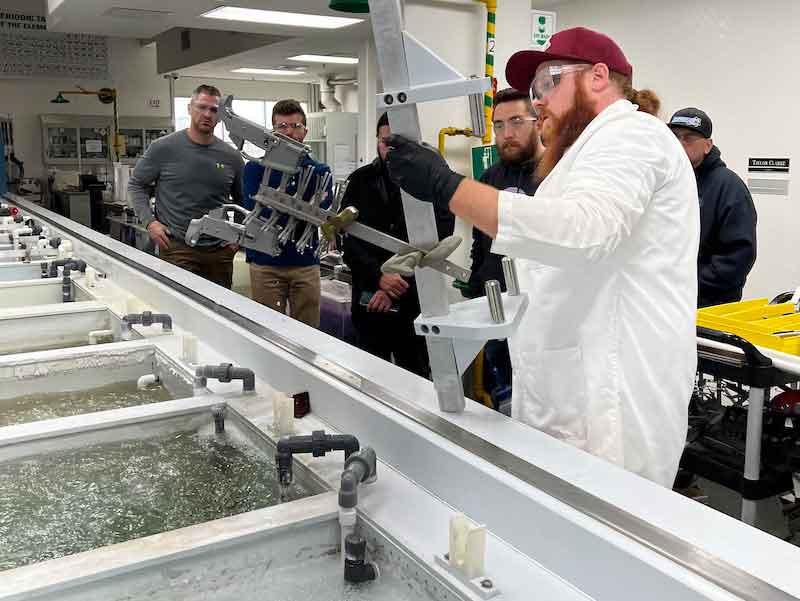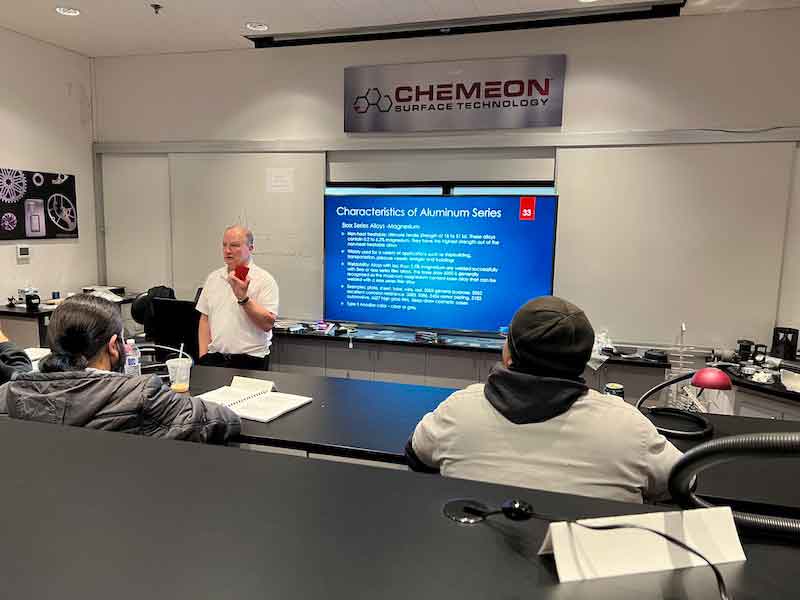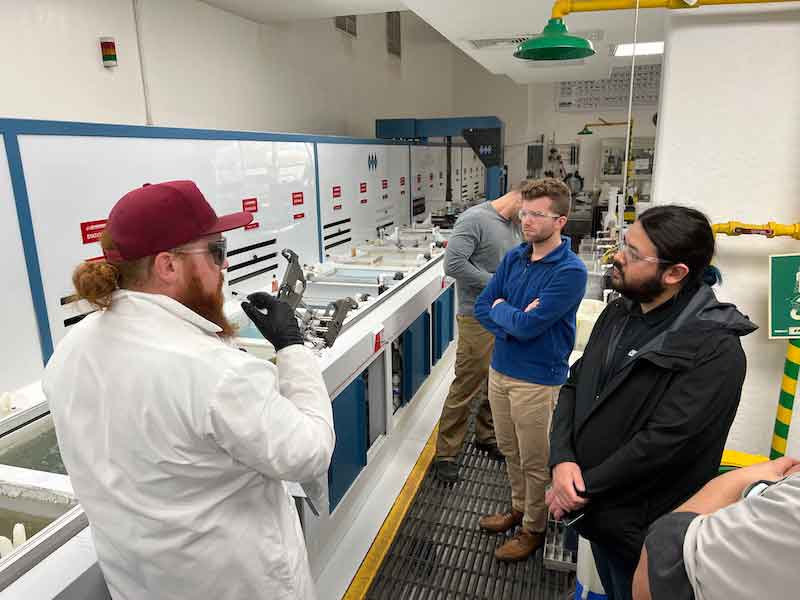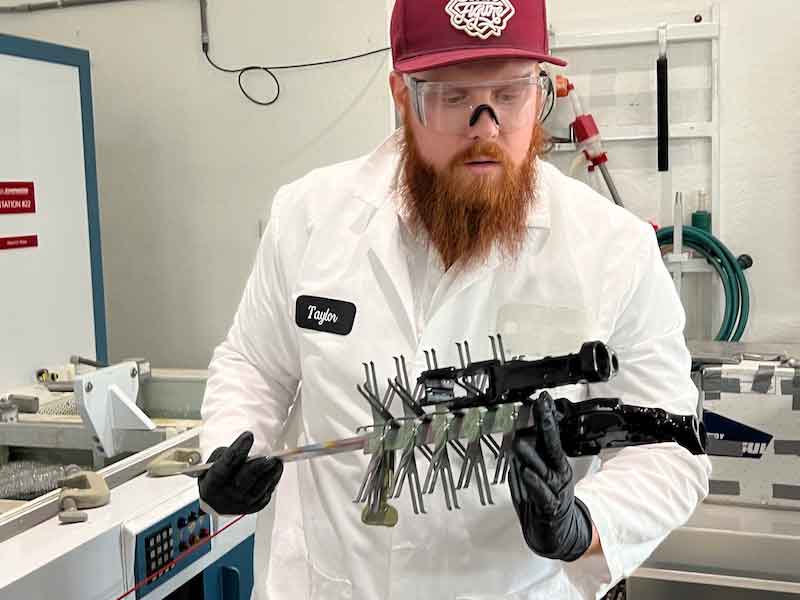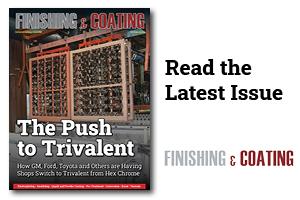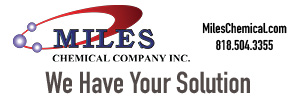Walt Tarr can go to any department at the Toyota Motor North America R&D facility in Ann Arbor, Michigan, and find the expertise he seeks.
But the Toyota materials engineer also knows that to go deeper into the knowledge of how his company’s vehicles are manufactured, he must also go outside of the facility.
 Walt Tarr, Toyota“For better or for worse, everything is based on suppliers in the automotive industry,” Tarr says. “We have a lot of technical experts here, but we also look at it that the suppliers are technical experts, too. They make the parts, or they finish them, and we have to learn as much as we can from them.”
Walt Tarr, Toyota“For better or for worse, everything is based on suppliers in the automotive industry,” Tarr says. “We have a lot of technical experts here, but we also look at it that the suppliers are technical experts, too. They make the parts, or they finish them, and we have to learn as much as we can from them.”
That search for knowledge is what led Tarr to an anodizing course taught at the Chemeon Surface Technology headquarters in Minden, Nevada. Dr. Sjon Westre, Chemeon’s Senior Vice President of Technology, presents the 2-day course several times a year to finishing shop personnel and to original equipment manufacturers such as Toyota and other automotive and aerospace companies.
Gaining Know-How Through Classroom and Hands-On Training
 Dr. Sjon Westre, Chemeon’s Senior Vice President of Technology, presents the 2-day course several times a year.Chemeon President Ted Ventresca says they have been offering two separate courses over the last few years: an introduction to anodizing as well as a course on trivalent chromium technology.
Dr. Sjon Westre, Chemeon’s Senior Vice President of Technology, presents the 2-day course several times a year.Chemeon President Ted Ventresca says they have been offering two separate courses over the last few years: an introduction to anodizing as well as a course on trivalent chromium technology.
“We have also been integrating special titanium coating courses that are mostly done on request,” Ventresca says. “We’ve been doing these trainings for many years, but we have been expanding the curriculum, and we have also been taking these trainings directly to a facility if the need arises.”
Tarr says that finishing processes are something that Toyota — and many other OEMs as well — do not have first-hand experience with, as opposed to some other steps in the manufacturing process.
“We do stamping and have that technical expertise as many others have, but finishing is something that we have limited in-house expertise,” Tarr says. “We’ve got many components that are plated — the logo on the car, for example — and it really needs to look good to show off the company. We need to build a lot of trust with our supplier who does that, but we also need to have an understanding of all that goes into it.”
Both Basic and Advanced Anodizing Curriculum
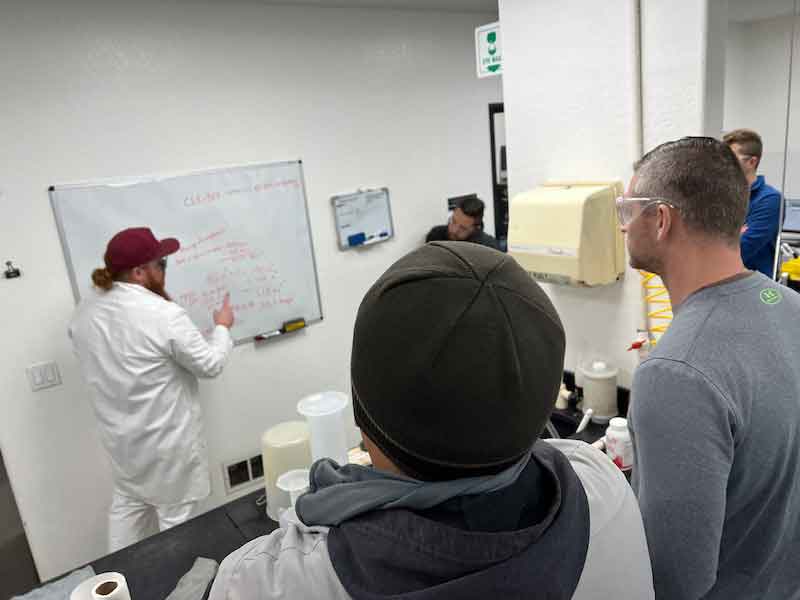 Taylor Clarke, Chemeon’s Process Chemist, go over the formula process with students.The Chemeon anodizing class offers an extensive dive into the basics of anodizing from Dr. Westre, as well as some advanced aspects of the process.
Taylor Clarke, Chemeon’s Process Chemist, go over the formula process with students.The Chemeon anodizing class offers an extensive dive into the basics of anodizing from Dr. Westre, as well as some advanced aspects of the process.
- Preprocessing: handling and inspection, aluminum alloys, mechanical finishing, and racking.
- Pretreatment: cleaning, etching, bright dipping, deoxidizing, desmutting, and rinsing.
- Anodizing: definition, the process of oxide formation, types of anodizing, Chemeon and anodize control, surface area calculations, factors contributing to oxide characteristics, and facility requirements.
- Quality control and troubleshooting.
- Hands-on training in the anodizing lab.
The last part of the training is a half-day spent in the anodizing lab, where Dr. Westre and Taylor Clarke, Chemeon’s Process Chemist, go over the process. Students are encouraged to bring their own materials for anodizing and discussion, too.
That was the case for Vegas Metal Finishing, which brought several of its products it anodizes at its Las Vegas facility, many of which are firearms from a sister company it owns. Mike Young and another VMF employee took the Chemeon class, which was especially helpful since the shop is just over a year old, and neither had that much experience in the anodizing process.
“It was an extremely helpful training to take,” says Young. “Our lead anodizer and I came back, and we immediately started to see that some of the changes we made were making us more efficient.”
Seeing Much Better Quality Outcomes
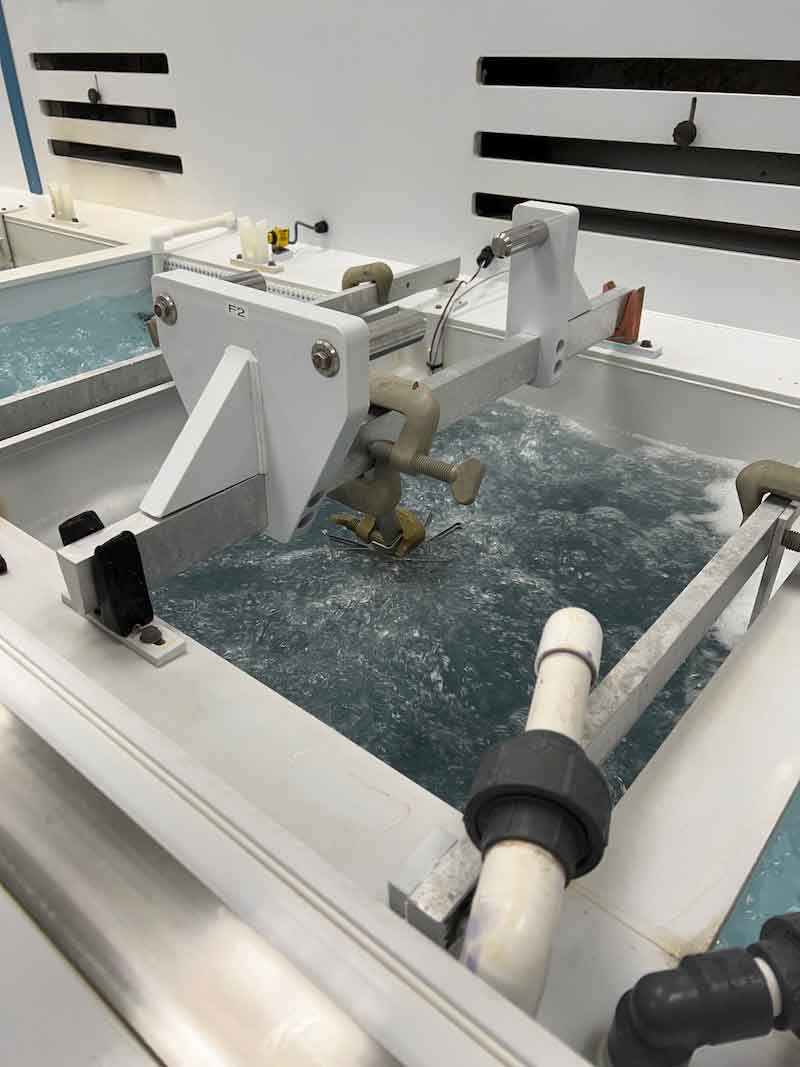 The VMF began to alter run times based on information gleaned from the class and used some of the techniques that Dr. Westre taught them.
The VMF began to alter run times based on information gleaned from the class and used some of the techniques that Dr. Westre taught them.
“We tweaked a few things, and we have much faster run times than before,” Young says. “We are also seeing much better quality outcomes for our finished products. What we learned in just those two days has really helped us become better anodizers, and that is the key.”
The transformation was so dramatic that Jennifer Young, the owner of VMF and Mike’s wife, says she has scheduled herself to take the class, too.
“I am taking our production manager up with me because I believe it is so vital,” she says. “The Chemeon folks have been extremely helpful to us, especially since we are just starting out in the industry. They follow up well and answer any additional questions we may have.”
Other shops say the Chemeon classes are a great “refresher,” even for those who have been in the industry for a long time.
Feeling Confident In Solving Anodize Issues
“The empowerment I received from completing the Chemeon anodizing course is second to none,” says Matthew Kennedy from Tulsa Metal Finishing. “The knowledge and passion shared by all at Chemeon were refreshing and reassuring. I feel much more confident in solving anodize issues after having completed this course.”
Scott Duncan from FM Industries in Scottsdale, Arizona, took the class a few years ago when he was new to the finishing industry.
“As a new anodize engineer, the training was invaluable to solidify my process knowledge and help me to better sustain our facility,” Duncan says. “They follow up the on-site training by providing a first-class reference manual that I still frequently use to solve problems.”
Vanessa Valentine, who manages the daily production workflow as well as various regulatory and corporate tasks at Milner’s Anodizing in Santa Rosa, California, says the “Best Practices and Troubleshooting” training was an excellent experience for her.
For Valentine, meeting other anodizers with the same issues and questions was extremely helpful in running their operation.
“The material presented was well organized and thorough, and there was adequate time for questions and the opportunity to learn from other participants,” she says. “It was especially valuable to run test panels in the lab portion of the training, which can include your own parts to run to solve problems or improve your process. And the take-home materials are a great resource for reference.”
Offering Online Courses in Addition to Classroom Training
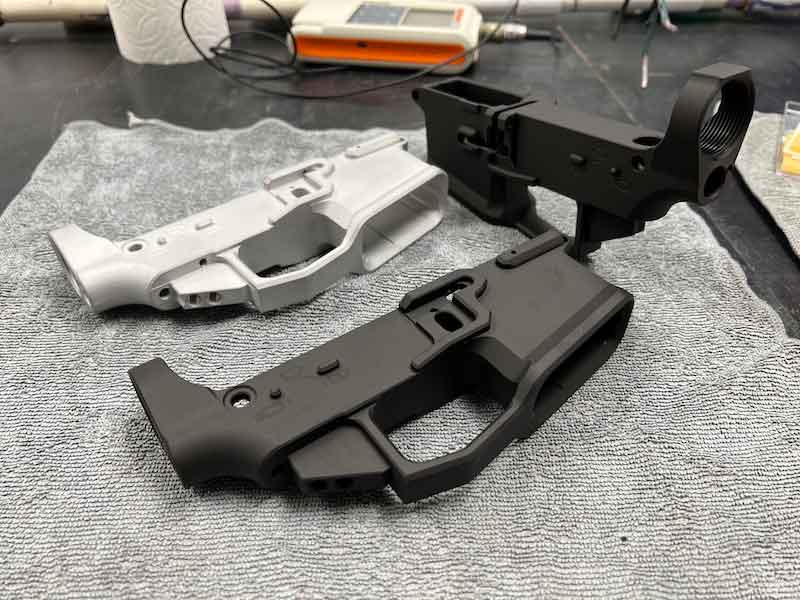 Students are encouraged to bring their own materials for anodizing and discussion, too.Ventresca says he worked with Dr. Westre to create an online version of the training course, which comes in handy when some shops restricted travel due to the pandemic, and other shops had trouble allowing their production people to be away from the shop for a few days.
Students are encouraged to bring their own materials for anodizing and discussion, too.Ventresca says he worked with Dr. Westre to create an online version of the training course, which comes in handy when some shops restricted travel due to the pandemic, and other shops had trouble allowing their production people to be away from the shop for a few days.
The in-class and online training has also been perfect for those customers of Chemeon who have adopted the company’s new eTCP trivalent chromium process, which is one-step corrosion protection and adhesion that exceeds MIL-DTL-5541 and MIL-DTL-81706 for immersion, spray, brush and touch up pen.
“There are a lot of variances and nuances to using any chemistry in the finishing industry,” Ventresca says. “We have identified that providing training and the best practices — as well as troubleshooting — is one way we can help a company and an individual’s business process. We want to make sure they are getting the best use of the chemistry and the best use of their process lines.”
'Speaking the Language of Finishing'
While applicators have come to appreciate the technical know-how they receive in training, Toyota’s Tarr says the course was extremely helpful for him when he needs to work with suppliers if an issue comes up that centers around a finish or coating.
“When you deal with new suppliers — and even those that you trust — there are going to be issues that come up,” Tarr says. “If I have as much technical knowledge as possible, then I know that it may be a bath issue or an electrical or substrate issue. There is a lot of value in that instead of me just writing an email back telling them that their test failed.”
The other advantage for manufacturers of sitting through a finishing or coating course is knowing the language that is spoken about the processes and technology.
“When management of an OEM comes to me and asks about a part, I don’t just want to tell them that it failed,” Tarr says. “They want more detail, and they want to know what could be the cause. From an engineer’s perspective, the ability to be a good communicator and a liaison between a supplier and management is so very important.”
Visit Chemeon's training page at https://chemeon.com/p/training/
Other Training Available to Finishers and Coaters
There are a plethora of trade associations that also offer specific training to job shops, finishing and coating facilities, and OEMS
Aluminum Anodizing Council
The AAC offers several courses throughout the year, including an Anodizing Essentials Class at the NASF SUR/FIN conference in June in Chicago, which addresses technology fundamentals and troubleshooting techniques to provide anodizing line workers with the practical knowledge needed to improve operations. The AAC Fall Conference and Exposition is in October in Kansas City. Please visit https://www.anodizing.org
Chemical Coaters Association International
CCAI is a technical and professional organization that provides information and training on surface coating technologies. They have a series of active local chapters across the U.S. that conduct technical meetings on all aspects of organic finishing. The CCAI Finishing Academy offers online courses in both liquid and powder coating education, and Pretreatment and System Design Courses will be added in 2023. CCAI also hosts training at FABTECH, which will be in Atlanta in November. Please visit https://www.ccaiweb.com
Electrocoat Association
The Electrocoat Association is a trade association that drives growth by providing access to information, education, and networking with industry leaders. They host the ECOAT conference every other year, with the next one slated for 2024, as well as various training and webinars throughout the year. Please visit http://www.electrocoat.org
National Association for Surface Finishing
Aside from holding training at its annual SUR/FIN conference, the NASF partners with the AESF Foundation to offer training courses both in-person and online. The NASF is the exclusive grantor of industry certifications, from basic Certified Electroplater Finisher (CEF) to Master Surface Finisher (MSF). Please visit https://nasf.org
Powder Coat Institute
PCI produces a variety of events to provide training and education to the powder coating professionals. Their popular Powder Coating 101 and Powder Coating 202 workshops are held several times throughout the year, as well as live webinars on hot topics for powder coaters. PCI’s signature event each year is the Powder Coating Technical Conference and Tabletop Exhibition. Please visit https://www.powdercoating.org





